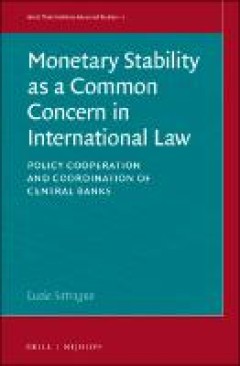Filter by

Framing Global Mathematics
This open access book is about the shaping of international relations in mathematics over the last two hundred years. It focusses on institutions and organizations that were created to frame the international dimension of mathematical research. Today, striking evidence of globalized mathematics is provided by countless international meetings and the worldwide repository ArXiv. The text follows …
- Edition
- 1
- ISBN/ISSN
- 978-3-030-95683-7
- Collation
- -
- Series Title
- -
- Call Number
- CCCLXXXIV, 20

International Actors and the Formation of Laws
This open access book addresses the discourse that creates, modifies, and reshapes the law, as well as discourse participants. The book focuses on the actors operating in legal regimes and their subtly, bluntly, or even outright aggressive impact on the formation of laws. As the book examines the intersection of domestic, European, international, and even transnational, legal regimes where new …
- Edition
- 1
- ISBN/ISSN
- 978-3-030-98351-2
- Collation
- -
- Series Title
- -
- Call Number
- XVIII, 197

Beyond Data
This open access book focuses on the impact of Artificial Intelligence (AI) on individuals and society from a legal perspective, providing a comprehensive risk-based methodological framework to address it. Building on the limitations of data protection in dealing with the challenges of AI, the author proposes an integrated approach to risk assessment that focuses on human rights and encompasses…
- Edition
- 1
- ISBN/ISSN
- 978-94-6265-531-7
- Collation
- -
- Series Title
- Information Technology and Law Series
- Call Number
- XXIII, 200

The Governance of Insurance Undertakings
This open access volume of the AIDA Europe Research Series on Insurance Law and Regulation brings together contributions from authors with different legal cultures. It aims to identify the legal issues that arise from the intersection of two disciplines: insurance law and corporate/company law. These legal issues are examined mainly from the perspective of European Union (EU) law. However, ther…
- Edition
- 1
- ISBN/ISSN
- -
- Collation
- -
- Series Title
- AIDA Europe Research Series on Insurance Law and Regulation
- Call Number
- X, 360

The International Handbook of Social Enterprise Law
This open-access book brings together international experts who shed new light on the status of social enterprises, benefit corporations and other purpose-driven companies. The respective chapters take a multidisciplinary approach (combining law, philosophy, history, sociology and economics) and provide valuable insights on fostering social entrepreneurship and advancing the common good. In …
- Edition
- 1
- ISBN/ISSN
- -
- Collation
- -
- Series Title
- -
- Call Number
- XVIII, 960

Liberating Kosovo: Coercive Diplomacy and U. S. Intervention
A compelling account of the diplomatic and military actions that led to Kosovo's independence and their implications for future U.S. and UN interventions.OCLC-licensed vendor bibliographic record.
- Edition
- -
- ISBN/ISSN
- 9780262306041
- Collation
- 1 online resource.
- Series Title
- -
- Call Number
- -

War and Reconciliation: Reason and Emotion in Conflict Resolution
A study of the role of reconciliation in intrastate and international conflict resolution and an argument for the value of integrating emotion in our conceptions of human rationality and problem-solving.OCLC-licensed vendor bibliographic record.
- Edition
- -
- ISBN/ISSN
- 9780262278522
- Collation
- 1 online resource (x, 235 pages) :illustrations
- Series Title
- -
- Call Number
- -

Monetary Stability as a Common Concern in International Law: Policy Cooperati…
Monetary Stability as a Common Concern in International Law convincingly argues that monetary stability should be recognised as a Common Concern of Humankind. It also claims that international monetary reform is needed and it provides a template for reform based on the theoretical foundations of the emerging doctrine of Common Concern.
- Edition
- Ed. 1
- ISBN/ISSN
- -
- Collation
- -
- Series Title
- -
- Call Number
- -

Collective Actions in Europe: A Comparative, Economic and Transsystemic Analysis
This open access book offers an analytical presentation of how Europe has created its own version of collective actions. In the last three decades, Europe has seen a remarkable proliferation of collective action legislation, making class actions the most successful export product of the American legal scholarship. While its spread has been surrounded by distrust and suspiciousness, today more t…
- Edition
- Ed. 1
- ISBN/ISSN
- -
- Collation
- 122
- Series Title
- SpringerBriefs in Law
- Call Number
- 346 NAG c

Terrorism, Criminal Law and Politics: The Decline of the Political Offence Ex…
Recent atrocities have insured that terrorism and how to deal with terrorists legally and politically has been the subject of much discussion and debate on the international stage. This book presents a study of changes in the legal treatment of those perpetrating crimes of a political character over several decades. It most centrally deals with the political offence exception and how it has com…
- Edition
- Ed. 1
- ISBN/ISSN
- 9780429583414, 9780367189044
- Collation
- -
- Series Title
- -
- Call Number
- 341 JAN t
 Computer Science, Information & General Works
Computer Science, Information & General Works  Philosophy & Psychology
Philosophy & Psychology  Religion
Religion  Social Sciences
Social Sciences  Language
Language  Pure Science
Pure Science  Applied Sciences
Applied Sciences  Art & Recreation
Art & Recreation  Literature
Literature  History & Geography
History & Geography